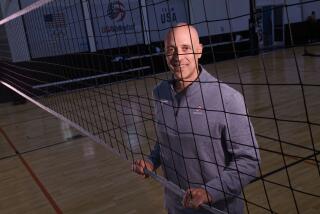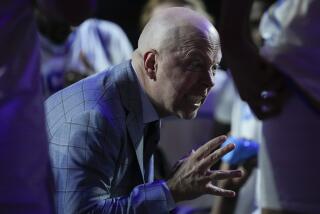Westphal Is Waves’ Choice
Once a point of departure for young coaches building resumes, Pepperdine is becoming a halfway house for the vanquished to repair their reputations.
Paul Westphal, six months removed from a player revolt that led to his firing by the Seattle SuperSonics, was hired by the Waves on Monday. He replaces Jan van Breda Kolff, whose 47-18 record in two seasons obscured his failings at Vanderbilt and enabled him to move on to St. Bonaventure.
Westphal, 50, did not plan to return to coaching this soon. The former USC star attended several Pepperdine games last season because his son Michael is a walk-on guard, but going from the stands to the sidelines never occurred to him.
“This opened up and hit quickly,” he said. “It is a good fit.”
Westphal, 50, has not coached at the Division I level. He has had two stints in the NBA, with the Phoenix Suns from 1992-95 and with Seattle from 1998-2000.
The Suns posted more than 55 victories in each of his three full seasons, won Pacific Division titles in 1993 and 1995 and advanced to the NBA finals in ’95.
His stint with the SuperSonics did not go as well. Seattle failed to make the playoffs in the lockout-shortened 1999 season and was eliminated in the first round by Utah last year. Westphal was fired in November, 15 games into a season marked by dissension and defeats.
The problems came to a head in an on-court shouting match between Westphal and guard Gary Payton during a game in Dallas. Payton reportedly told Westphal in the huddle that he didn’t care “about this game anymore.” “You all can suspend me for the rest of my career.”
General Manager Wally Walker suspended Payton the next day, but backpedaled hours later, saying Payton apologized. Westphal packed his bags a few days later.
Westphal believes coaching at the college level will be refreshing.
“What I like about college is you have a chance to develop a teacher-pupil relationship with kids, more so than the NBA, for sure,” he said. “That’s why I got into coaching in the first place.”
Westphal’s daughter is a Pepperdine graduate and Michael will be a senior in 2001-02. The Waves tried to hire Westphal in 1996, but although he wasn’t employed, he declined. Lorenzo Romar was hired instead. Romar later left for Saint Louis.
“It’s a place I’ve identified as a good school,” Westphal said. “I like the location. I’m a Southern California guy. I like the level of competition. We can compete with the big boys, but don’t have to get down into the mud the way big programs feel they have to do.”
Westphal was chosen instead of Tom Asbury, who led the Waves to three NCAA tournament appearances from 1988-94 before leaving to coach at Kansas State. Asbury, 55, was considered the safer choice because he probably would have finished his career at Pepperdine.
Westphal agreed to a five-year contract, but a string of winning seasons certainly could open up a more high-profile opportunity.
“Paul Westphal is a product of a solid basketball background, both as a coach and player, and his ethical values are attractive to a school like Pepperdine,” Athletic Director John Watson said. “I’m confident he will elevate our program to a new level of excellence.”
Westphal’s initial focus will be on hiring assistants, signing a recruit or two and trying to persuade all-West Coast Conference guard Brandon Armstrong to return to Pepperdine rather than go into the NBA draft. Armstrong made himself available to the NBA two weeks ago but has until a week before the draft to change his mind.
“I need to talk to [Armstrong],” Westphal said. “Certainly I’ll have advice if he is willing to listen. Hopefully, I’ll have input in his decision.”
Like Van Breda Kolff, Westphal is a former NBA player who should quickly gain the respect of players. After starring at Redondo Beach Aviation High and leading USC to a 24-2 record in 1970-71, Westphal played 12 NBA seasons. He led the Suns in scoring five years in a row with a high of 25.2 in 1977-78.
He plans to continue the up-tempo style implemented by Van Breda Kolff.
“I really like the up-tempo game and pressing defenses,” Westphal said. “For the kids in the program now, it’s a good style for them. We might even press more than [last season’s team] did. We have rangy, quick athletes, and that’s a good way to play.”
More to Read
Go beyond the scoreboard
Get the latest on L.A.'s teams in the daily Sports Report newsletter.
You may occasionally receive promotional content from the Los Angeles Times.











